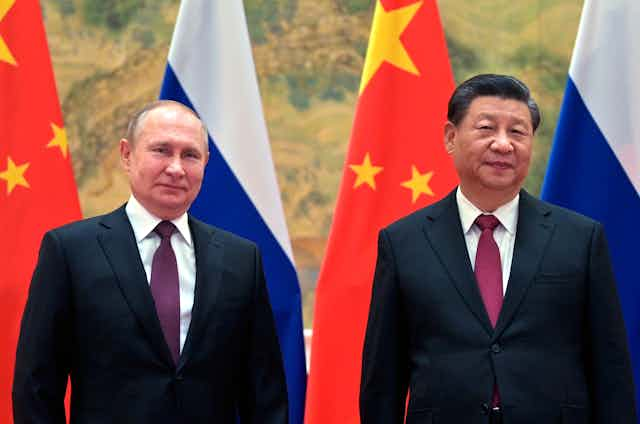Many geopolitical analysts and Russia experts are raising the spectre of nuclear weapons being used during the war in Ukraine. Because of the urgency of the situation, all avenues must be pursued to find a negotiated solution to the conflict.
As a specialist in international negotiations, my attention is naturally drawn to diplomatic options to crisis situations. One such option would involve China assuming an important mediation role. The objective of this article is to explain why it would be in China’s interest to act as an intermediary between Russia and Western countries.
A precarious balance for China
Within China itself, there are calls for Beijing to take a firm stance and unequivocally condemn the Russian invasion of Ukraine. These heartfelt cries were illustrated in an open letter written by five renowned Chinese historians, whose words were summarized in the British daily the Guardian.
If China were to do this, it would not contradict the principle of respect for the territorial integrity of states, one of the three central tenets of Xi Jinping’s foreign policy. China’s ambassador to Ukraine was quick to reaffirm this principle by stating that Beijing respects Ukrainian sovereignty. However, applying this principle cannot push Beijing to the point of issuing a strict condemnation of Russia, its strategic ally in international forums such as the United Nations Security Council.
Moreover, a resolute alliance with western forces, under American leadership in NATO, would also run counter to a second pillar of Xi’s geopolitical vision: his quest for geostrategic parity with the United States. Unconditionally adhering to NATO’s aims in this conflict would amount to an admission by the Chinese president that his country is not dealing with Washington as an equal.
Aligning with forces opposed to Moscow would, however, strengthen the third pillar of Xi’s strategy, namely increasing participation in international economic institutions in order to support China’s domestic growth.
In short, a rapprochement with the world’s major democracies, under the guise of repudiating the Putin regime, would put China at odds with two of its major global objectives.
The other option, that of rallying to Russia, would allow China to achieve only one of its three geostrategic objectives. Undermining American ascendancy over the world political and security order would help Xi toward his goal of achieving geostrategic parity with the United States.
This direct confrontation with Washington and its allies, however, would work directly against Beijing’s two other long-term goals.

The politics of strategic ambiguity
The invasion of Ukraine by Russia, its informal ally, is rushing things for the Chinese Communist Party, which is methodically pursuing long-term planning of its objectives.
Putin’s untimely actions in Ukraine present Xi with difficult choices. On the one hand, open support for Moscow would put the Chinese in the cross hairs of western sanctions, which would undermine international support for China’s goal of reformulating the terms of the global political order. On the other hand, by standing firmly behind western nations, China would subjugate itself to a reassertion of the hegemonic role of the United States as a guarantor of global stability.
This leaves only one middle ground option for China, that of strategic ambiguity. Abstention is China’s most effective political instrument in the short term. It is obviously not an ideal position from which to achieve the goal of reformulating the terms of the international economic order, but it could be a profitable policy in the longer term. Presenting a conciliatory and non-belligerent face would allow Beijing to preserve its principle of formal non-interference while maintaining a certain respect for contemporary international institutions.
By not taking a firm stance in either direction, Beijing would be able to support Russia economically by continuing to purchase its oil and gas products and by supplying it with essential non-military goods. That would allow it to thumb its nose at the West, while avoiding direct confrontation.
China’s role as mediator
More importantly, strategic ambiguity on the part of China could have a beneficial effect and help untie the Gordian knot of the crisis.
Despite the goodwill of French President Emmanuel Macron, who has had several long phone calls with Vladimir Putin, it is clear that the latter is dismissing the West’s grievances. Only China has the potential to make Putin listen to reason. China’s decision to act as a mediator would make a diplomatic solution to the conflict possible. This would allow China to restore its image and would contribute to its long-term objectives.
So it’s worth asking, if the role of being an intermediary between the Russians, Ukrainians and NATO serves China’s geostrategic objectives, why hasn’t China already offered to do so? The answer may eventually lie in the situation on the ground. It could be in China’s interest to have Putin consolidate the position of his troops on Ukrainian territory. The possible shift from an armed invasion to a prolonged state of siege would shift the balance of power.
On the one hand, Western nations would be faced with a situation where the Russians are trying to impose their will on a large part of Ukrainian territory. On the other hand, Moscow would suffer from the increasing cost of an occupation and economic sanctions. This might make it a good time for Beijing to step in and offer a diplomatic solution to the conflict. The nature of the peaceful resolution is as yet unknown and will vary depending on the situation on the ground. As a result, it would be presumptuous to try to define the terms or such an agreement right now. Nevertheless, a concrete intervention, whether successful or not, would raise China’s profile on the international stage.
However, the United States and its allies might oppose China’s mediation efforts. This would be a serious mistake. Given the urgency of the situation, no peaceful option should be dismissed out of hand.


